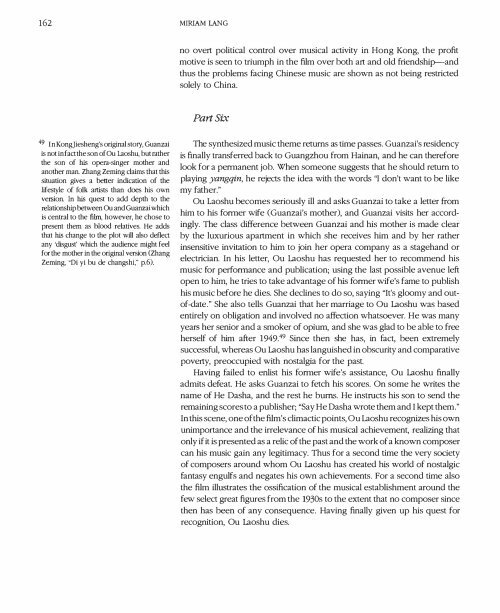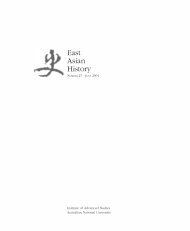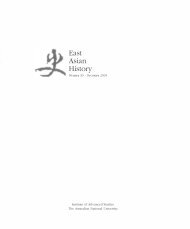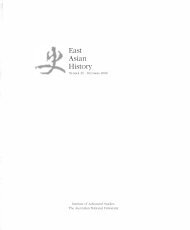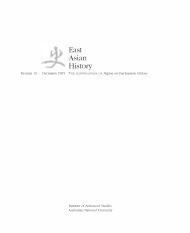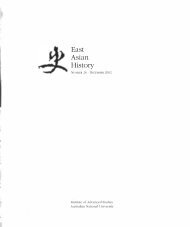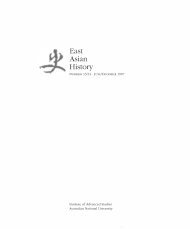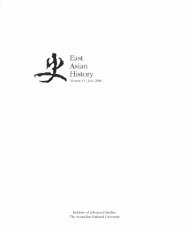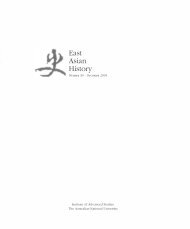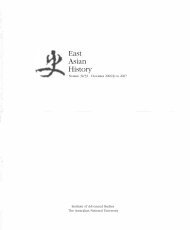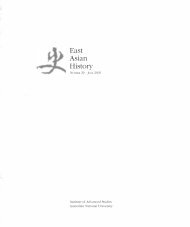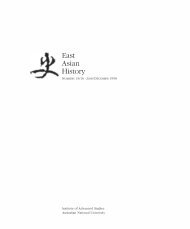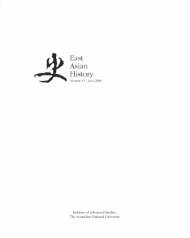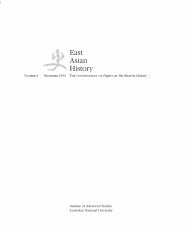Observations from a Film - (Miriam Lang) (PDF ... - East Asian History
Observations from a Film - (Miriam Lang) (PDF ... - East Asian History
Observations from a Film - (Miriam Lang) (PDF ... - East Asian History
- No tags were found...
Create successful ePaper yourself
Turn your PDF publications into a flip-book with our unique Google optimized e-Paper software.
162MIRIAM LANGno overt political control over musical activity in Hong Kong, the profitmotive is seen to triumph in the film over both art and old friendship--andthus the problems facing Chinese music are shown as not being restrictedsolely to China.Part Six4 9 In KongJiesheng's original story, Guanzaiis not in fact the son of Ou Laoshu, but ratherthe son of his opera-singer mother andanother man. Zhang Zeming claims that thissituation gives a bener indication of thelifestyle of folk artists than does his ownversion. In his quest to add depth to therelationship between Ou and Guanzai whichis central to the film, however, he chose topresent them as blood relatives. He addsthat his change to the plot will also deflectany 'disgust' which the audience might feelfor the mother in the original version (ZhangZeming, "Di yi bu de changshi," p.6).The synthesized music theme returns as time passes. Guanzai's residencyis finally transferred back to Guangzhou <strong>from</strong> Hainan, and he can thereforelook for a pennanent job. When someone suggests that he should return toplaying yangqin, he rejects the idea with the words "I don't want to be likemy father."Ou Laoshu becomes seriously ill and asks Guanzai to take a letter <strong>from</strong>him to his fonner wife (Guanzai's mother), and Guanzai visits her accordingly.The class difference between Guanzai and his mother is made clearby the luxurious apartment in which she receives him and by her ratherinsensitive invitation to him to join her opera company as a stagehand orelectrician. In his letter, Ou Laoshu has requested her to recommend hismusic for perfonnance and publication; using the last possible avenue leftopen to him, he tries to take advantage of his fonner wife's fame to publishhis music before he dies. She declines to do so, saying "It's gloomy and outof-date."She also tells Guanzai that her marriage to Ou Laoshu was basedentirely on obligation and involved no affection whatsoever. He was manyyears her senior and a smoker of opium, and she was glad to be able to freeherself of him after 1949. 49 Since then she has, in fact, been extremelysuccessful, whereas Ou Laoshu has languished in obscurity and comparativepoverty, preoccupied with nostalgia for the past.Having failed to enlist his fonner wife's assistance, Ou Laoshu finallyadmits defeat. He asks Guanzai to fetch his scores. On some he writes thename of He Dasha, and the rest he burns. He instructs his son to send theremaining scores to a publisher; "Say He Dasha wrote them and I kept them."In this scene, one of the film's climactic points, Ou Laoshu recognizes his ownunimportance and the irrelevance of his musical achievement, realizing thatonly if it is presented as a relic of the past and the work of a known composercan his music gain any legitimacy. Thus for a second time the very societyof composers around whom Ou Laoshu has created his world of nostalgicfantasy engulfs and negates his own achievements. For a second time alsothe film illustrates the ossification of the musical establishment around thefew select great figures <strong>from</strong> the 1930s to the extent that no composer sincethen has been of any consequence. Having finally given up his quest forrecognition, Ou Laoshu dies.


